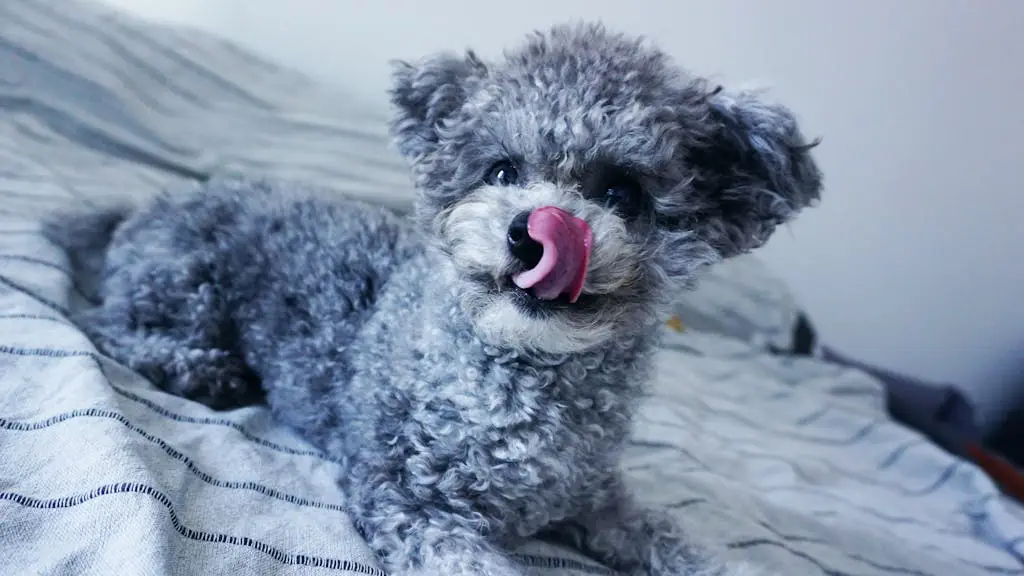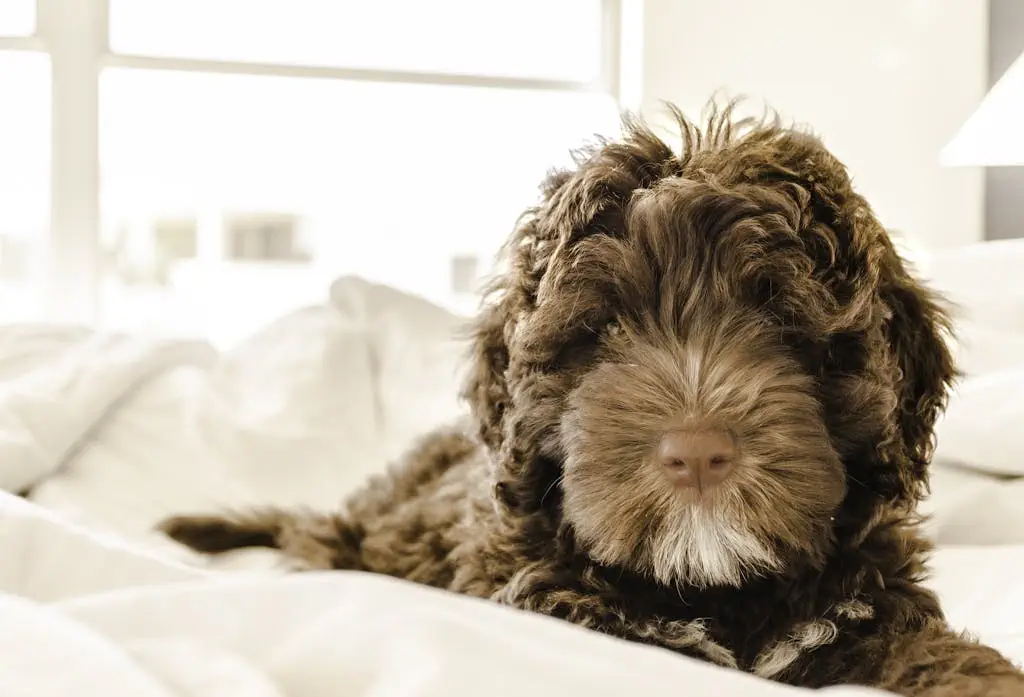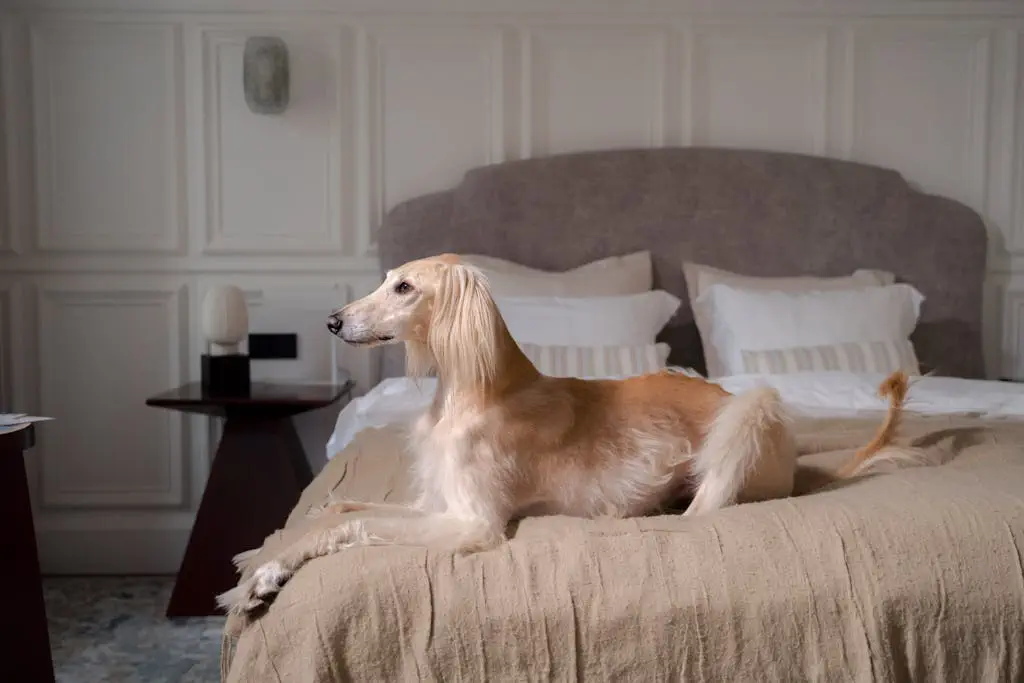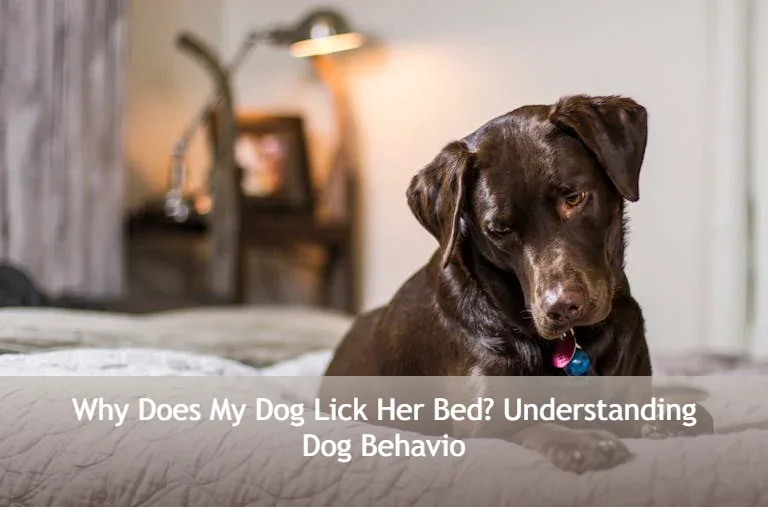Have you ever caught your dog licking her bed like it’s the most delicious treat around? If you’re wondering why does my dog lick her bed, you’re not alone! This quirky habit can leave many dog owners scratching their heads, but understanding it is important for your pup’s well-being. Ignoring this behavior might lead to bigger issues, like anxiety or even health problems, so it’s essential to get to the bottom of it.
In this article, we’ll dive into the common reasons behind this licking behavior, from anxiety to potential health concerns. You’ll also discover how to differentiate between normal licking and obsessive habits that might need attention. Plus, we’ll share effective solutions to help manage your dog’s behavior. So, if you’re curious about your furry friend’s strange habits, keep reading to learn more!
Why Does My Dog Lick Her Bed? Exploring Behavior Causes

Common Reasons for Dog Lick
Dogs lick their beds for a variety of reasons. One natural behavior is grooming, where dogs lick to clean themselves and their surroundings. Puppies and older dogs alike may lick as part of their normal pattern to maintain hygiene. Licking also provides a soothing feeling, helping dogs feel calm and secure, especially in unfamiliar environments or when they’re stressed or anxious.
Sometimes, licking is driven by simple curiosity or the alluring scent of yummy food residue on the bed. Dogs may flick their tongue to explore scent particles or taste different surfaces. Boredom can also play a role; dogs who lack sufficient physical activity or mental stimulation might lick their beds out of habit or to self-soothe. Pet parents may sometimes see an increase in licking behavior during periods of reduced daily exercise or less social interaction.
Additionally, licking can be a form of distraction or a quirky habit that dogs develop to cope with feelings of anxiety, stress, or separation anxiety. It’s important to monitor if the licking becomes excessive or constant, as it might be classed as obsessive behavior.
References:
Is Licking a Sign of Health Issues?
While licking in dogs is often normal, excessive licking of beds or furniture can indicate underlying health issues. Allergic diseases—including allergies to fleas, flea bites, food, or environmental allergens—often cause skin redness, itching, and discomfort, prompting dogs to lick affected areas or their bedding. (Royan Canin, Next Mune)
Other medical reasons include skin conditions such as fungal infections, bacterial infections, hot spots, yeast infections, or autoimmune issues that cause irritation and pain. Dogs experiencing joint disease, arthritis, or anatomical issues may also lick frequently as a mechanism for anxiety or to soothe feelings of pain.
Gastrointestinal (GI) upset, including nausea or an upset stomach, can lead to increased licking behavior as dogs try to comfort themselves. Dental issues and bladder infections are additional medical causes that may manifest through abnormal licking behavior.
Separating Obsessive from Normal Behavior
Normal licking occurs occasionally and serves practical purposes like grooming or calming. However, obsessive licking is repetitive and compulsive, often causing physical harm such as skin damage or secondary infections.
If your dog is excessively licking surfaces including beds or furniture despite attempts at distraction or redirection, this behavior may be considered obsessive-compulsive disorder in dogs. Obsessive licking warrants attention from a veterinary professional or an ethical dog behaviorist to address the deeper issue. This compulsive habit often stems from either anxiety disorders, cognitive decline in older dogs, boredom due to lack of enrichment toys or physical activity, or an underlying medical problem.
The Impact of Anxiety on Your Dog Licking the Bed

How Anxiety Influences Dog Behavior
Anxiety plays a significant role in increased licking behavior. When dogs are stressed—due to separation anxiety, unfamiliar environments, or changes in routine—they may engage in licking as a self-soothing behavior. This repetitive motion helps release tension and creates a temporary sense of calm.
Anxiety-driven licking is often accompanied by other signs such as increased barking, restlessness, poor rest or reduced hours of sleep per day, and changes in activity level. Dogs trying to cope with anxiety might also suck on surfaces or display strange behaviors not typical for them.
Identifying Anxiety Symptoms in Dogs
Pet parents should look for signs of anxiety that include:
- Excessive licking beyond normal grooming
- Restlessness or pacing
- Increased vocalization such as barking or whining
- Avoidance of usual activities and reduced social interaction
- Repetitive behaviors like trash-raiding or licking furniture excessively
Knowing that dogs express emotions they’re experiencing through behavior helps you understand when they’re anxious. Older dogs may show cognitive decline that increases anxiety levels and triggers more compulsive licking.
Solutions for Anxiety-Driven Licking
Managing anxiety-related licking involves creating a calm and stress-free environment. This includes:
- Establishing a consistent daily routine with regular physical activity like aerobic exercise and games of fetch
- Providing mental stimulation through interactive games and enrichment toys
- Using positive reinforcement to reward calm behavior
- Implementing behavior modification therapy under guidance from an ethical animal behaviorist
- Considering prescription medications or anti-inflammatory pain medication if recommended by your vet for anxiety disorders
A supportive environment with a bedtime routine can help reduce stress and prevent excessive licking behaviors.
Addressing Health Issues Related to Dog Lick the Bed

Health Conditions that Cause Licking
Common health issues linked to excessive bed licking include:
- Allergic disease (food allergies, allergy to fleas/flea bites)
- Skin conditions (fungal infections, bacterial infections, hot spots)
- Joint pain and arthritis
- Anal sac disease
- Gastrointestinal upset (nausea, upset tummies)
- Bladder infections
- Dental problems
Each condition may cause discomfort that leads a dog to lick as a way to manage feelings of pain or irritation.
Consult with a Veterinarian for Persistent Licking
If your dog’s licking persists beyond occasional grooming or comfort-seeking, make sure to consult your veterinarian. The vet’s guide will help identify any underlying health issues through allergy testing, allergy profile assessments, physical exams, and diagnostic tests.
Early diagnosis can prevent secondary infections and reduce abnormal behavior caused by discomfort.
Home Remedies for Managing Dog Lick
While waiting for veterinary care:
- Use oatmeal baths for skin irritation
- Try anti-itch sprays approved by vets
- Switch to hypoallergenic bedding
- Provide alternative stimulation with toys to distract from licking
Remember these remedies support but do not replace professional treatment.
Understanding Obsessive Licking and How to Solve It

What is Obsessive Licking in Dogs?
Obsessive licking is a compulsive habit where the dog licks excessively and repetitively without apparent reason. It can be classed as obsessive-compulsive disorder if it interferes with daily life or causes physical harm.
This behavior often stems from anxiety concerns, boredom due to lack of mental exercise and physical activity, or underlying medical problems.
Effective Methods to Solve Obsessive Licking
To manage obsessive licking:
- Increase daily exercise and mental stimulation
- Offer toys for dogs that encourage positive engagement
- Implement behavior modification therapy focusing on distraction and redirection
- Use anti-anxiety treatments when prescribed
- Seek help from an ethical dog behaviorist for personalized guidance
Best Practices for Managing Obsessive Behavior
Consistency in routine combined with physical and cognitive enrichment forms the sweet spot for managing compulsive licking. A balanced life including social interaction and aerobic exercise reduces the risk of behavior-driven dog licking becoming problematic.
Preventing Your Dog from Licking Furniture and the Bed

Engaging Activities to Prevent Boredom
Prevent boredom-related licking by providing:
- Interactive games
- Enrichment toys
- Regular walks and aerobic exercise
- Training sessions that offer mental challenge
Creating a Comfortable Environment for Dogs
Ensure your canine companion has:
- A soft bed in a quiet area
- Familiar scents nearby (like your clothing)
- A calm and stress-free environment free from loud noises
Monitoring and Modifying Dog Behavior
Observe your dog’s pattern of behavior closely. When you see dogs presenting excessive licking:
- Gently redirect them to alternative activities
- Reward positive behavior with treats and praise
- Maintain a stable daily routine including adequate sleep (hours of sleep per day)
Conclusion
Licking beds is a natural behavior for dogs rooted in grooming, comfort-seeking, anxiety relief, or health issues. While occasional licking is normal, excessive or obsessive licking can signal emotional distress or underlying medical problems. Doggy parents should ensure their furry companions have enough physical activity, mental stimulation, comfort, and veterinary care when needed. Recognizing the signs early helps maintain your dog’s physical wellbeing and mental health for healthy lives together.
FAQs
1. What if my dog’s licking doesn’t stop?
Persistent licking should be evaluated by a veterinarian to rule out medical conditions or behavioral disorders needing treatment.
2. Can licking be harmful to my dog?
Yes, excessive licking can cause skin irritation, sores, or secondary infections if left unmanaged.
3. What are some signs of a happy dog?
Relaxed body posture, wagging tail, playful behavior, eagerness to interact with owners and other animals, good appetite, and curiosity about their environment indicate happiness.
4. How can I reduce my dog’s anxiety-related licking?
Provide regular exercise, mental stimulation through toys and games, establish routines, create a calm environment, and consult your vet for possible anxiety treatments.
5. When should I see an animal behaviorist?
If obsessive licking persists despite home interventions and veterinary treatment, an ethical animal behaviorist can offer specialized behavior modification therapy.

